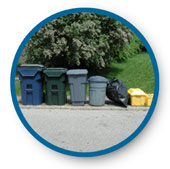Basic Information
Note: EPA no longer updates this information, but it may be useful as a reference or resource.

Communities across the country face the challenge of making recycling programs cost-effective. Though many communities express broad public support for recycling, there is a perception that recycling programs are costly and outmoded. However, by taking advantage of opportunities to improve efficiency, many communities are discovering that recycling makes more economic sense than they previously realized.
Recycling has significant economic benefits. It prevents emissions of many greenhouse gases, reduces pollutants, saves energy, conserves resources, and reduces the need for new landfills and combustors. In 2006, Americans recycled 32.5 percent of municipal solid waste, which prevented the release of 52 million metric tons of carbon equivalent—the same as taking 41.2 million cars off the road.
EPA created the Tools for Local Government Recycling Programs website to help local governments and community leaders learn how to make recycling work in their area. On this website, local officials will learn how to:
- Evaluate the costs associated with curbside recycling programs and consider options for reducing these costs.
- Adjust recycling contract specifications to improve the financial viability of recycling programs.
- Consider the impacts of program and policy changes on the economics of recycling such as adding a commodity to residential collections, changing the frequency of collections, or increasing participation.
- Take advantage of innovative approaches for increasing participation in residential programs such as social marketing and pay-as-you-throw incentives.
- Find outreach materials (e.g., brochures, posters, etc.) that can be adapted to any community to increase participation in recycling programs and educate the public.
- Estimate and articulate both the environmental and economic benefits of a recycling program.
- Work with schools and businesses to reduce waste and increase recycling, as well as increase recycling efforts at community events.
An online Residential Recycling Program Calculator is also provided to help local governments analyze current recycling program costs and test the effectiveness of implementing various program changes on the bottom line.
![[logo] US EPA](../gif/logo_epaseal.gif)